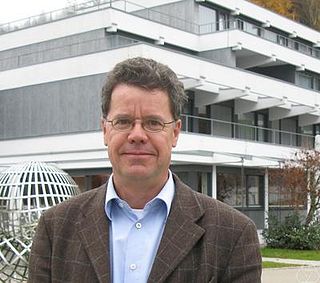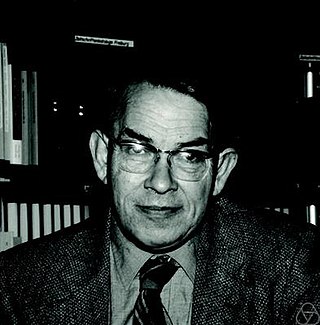
Category theory is a general theory of mathematical structures and their relations. It was introduced by Samuel Eilenberg and Saunders Mac Lane in the middle of the 20th century in their foundational work on algebraic topology. Category theory is used in almost all areas of mathematics. In particular, many constructions of new mathematical objects from previous ones that appear similarly in several contexts are conveniently expressed and unified in terms of categories. Examples include quotient spaces, direct products, completion, and duality.
In mathematics, pointless topology, also called point-free topology and locale theory, is an approach to topology that avoids mentioning points, and in which the lattices of open sets are the primitive notions. In this approach it becomes possible to construct topologically interesting spaces from purely algebraic data.
In category theory, a subobject classifier is a special object Ω of a category such that, intuitively, the subobjects of any object X in the category correspond to the morphisms from X to Ω. In typical examples, that morphism assigns "true" to the elements of the subobject and "false" to the other elements of X. Therefore, a subobject classifier is also known as a "truth value object" and the concept is widely used in the categorical description of logic. Note however that subobject classifiers are often much more complicated than the simple binary logic truth values {true, false}.
In mathematics and computer science, computational number theory, also known as algorithmic number theory, is the study of computational methods for investigating and solving problems in number theory and arithmetic geometry, including algorithms for primality testing and integer factorization, finding solutions to diophantine equations, and explicit methods in arithmetic geometry. Computational number theory has applications to cryptography, including RSA, elliptic curve cryptography and post-quantum cryptography, and is used to investigate conjectures and open problems in number theory, including the Riemann hypothesis, the Birch and Swinnerton-Dyer conjecture, the ABC conjecture, the modularity conjecture, the Sato-Tate conjecture, and explicit aspects of the Langlands program.

Eugenio Calabi was an Italian-born American mathematician and the Thomas A. Scott Professor of Mathematics at the University of Pennsylvania, specializing in differential geometry, partial differential equations and their applications.
Categorical logic is the branch of mathematics in which tools and concepts from category theory are applied to the study of mathematical logic. It is also notable for its connections to theoretical computer science. In broad terms, categorical logic represents both syntax and semantics by a category, and an interpretation by a functor. The categorical framework provides a rich conceptual background for logical and type-theoretic constructions. The subject has been recognisable in these terms since around 1970.
Czesław Ryll-Nardzewski was a Polish mathematician.

Steve Vickers is a British mathematician and computer scientist. In the early 1980s, he wrote ROM firmware and manuals for three home computers, the ZX81, ZX Spectrum, and Jupiter Ace. The latter was produced by Jupiter Cantab, a short-lived company Vickers formed together with Richard Altwasser, after the two had left Sinclair Research. Since the late 1980s, Vickers has been an academic in the field of geometric logic, writing over 30 papers in scholarly journals on mathematical aspects of computer science. His book Topology via Logic has been influential over a range of fields. In October 2018, he retired as senior lecturer at the University of Birmingham. As announced on his university homepage, he continues to supervise PhD students at the university and focus on his research.

Peter Jephson Cameron FRSE is an Australian mathematician who works in group theory, combinatorics, coding theory, and model theory. He is currently half-time Professor of Mathematics at the University of St Andrews, and Emeritus Professor at Queen Mary University of London.

"In dulci jubilo" is a traditional Christmas carol. In its original setting, the carol is a macaronic text of German and Latin dating from the Middle Ages. Subsequent translations into English, such as J. M. Neale's arrangement "Good Christian Men, Rejoice" have increased its popularity, and Robert Pearsall's 1837 macaronic translation is a mainstay of the Christmas Nine Lessons and Carols repertoire. J. S. Bach's chorale prelude based on the tune is also a traditional postlude for Christmas services.
In the mathematical theory of categories, a sketch is a category D, together with a set of cones intended to be limits and a set of cocones intended to be colimits. A model of the sketch in a category C is a functor
Roger Meyer Temam is a French applied mathematician working in numerical analysis, nonlinear partial differential equations and fluid mechanics. He graduated from the University of Paris – the Sorbonne in 1967, completing a doctorate under the direction of Jacques-Louis Lions. He has published over 400 articles, as well as 12 books.
In mathematics, a topos is a category that behaves like the category of sheaves of sets on a topological space. Topoi behave much like the category of sets and possess a notion of localization; they are a direct generalization of point-set topology. The Grothendieck topoi find applications in algebraic geometry; the more general elementary topoi are used in logic.

Edward Brian Davies is a former professor of Mathematics, King's College London (1981–2010), and is the author of the popular science book Science in the Looking Glass: What do Scientists Really Know. In 2010, he was awarded a Gauss Lecture by the German Mathematical Society.

Izak "Ieke" Moerdijk is a Dutch mathematician, currently working at Utrecht University, who in 2012 won the Spinoza prize.

Colin McLarty is an American logician whose publications have ranged widely in philosophy and the foundations of mathematics, as well as in the history of science and of mathematics.
Ian Robertson Porteous was a Scottish mathematician at the University of Liverpool and an educator on Merseyside. He is best known for three books on geometry and modern algebra. In Liverpool he and Peter Giblin are known for their registered charity Mathematical Education on Merseyside which promotes enthusiasm for mathematics through sponsorship of an annual competition.

Walter Kurt Hayman FRS was a British mathematician known for contributions to complex analysis. He was a professor at Imperial College London.
In mathematics, and especially in order theory, a nucleus is a function on a meet-semilattice such that :
In mathematical logic, geometric logic is an infinitary generalisation of coherent logic, a restriction of first-order logic due to Skolem that is proof-theoretically tractable. Geometric logic is capable of expressing many mathematical theories and has close connections to topos theory.









